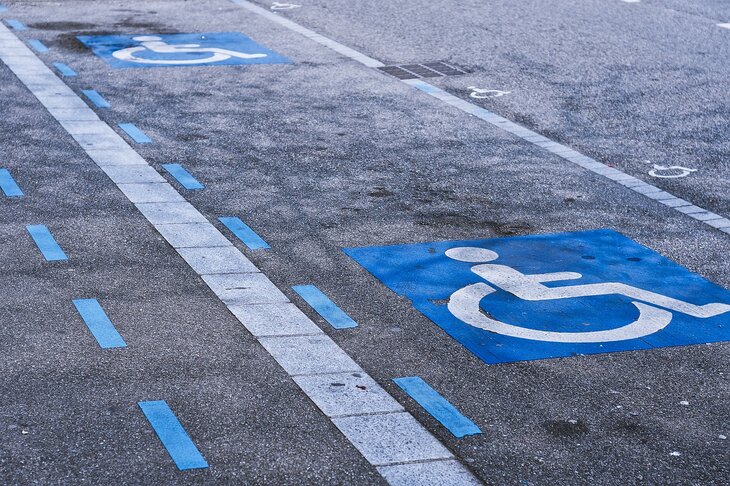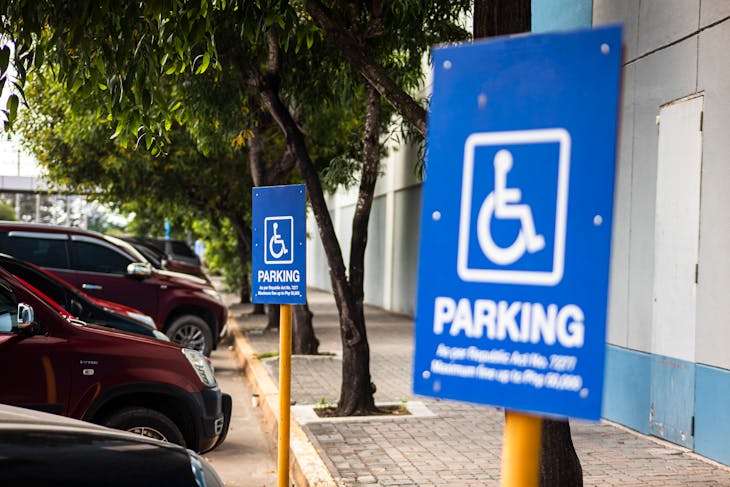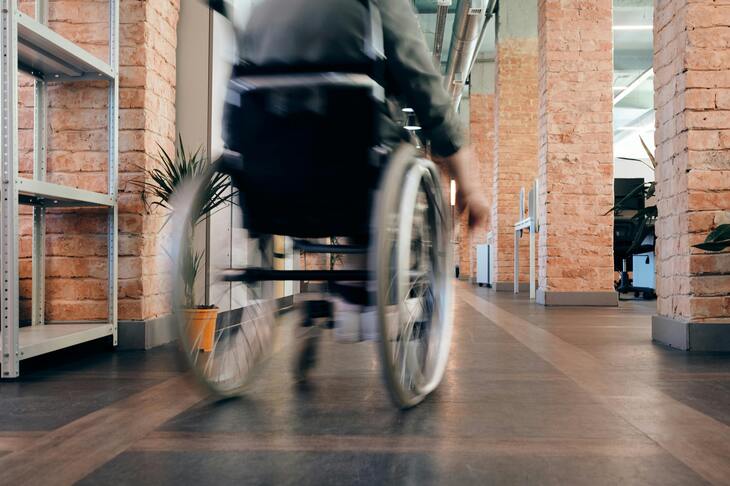Going through daily life with a disability can be difficult, but a handicap permit can make it significantly easier. These permits provide essential parking privileges, allowing you to park closer to your destination and access facilities more conveniently. As a matter of fact, getting a handicap permit In Indiana is a simple process, but it requires attention to detail. So, this guide will walk you through every step, ensuring you can secure your permit without any hassle.
Who Qualifies for a Handicap Permit in Indiana?
Before diving into the application process, it’s crucial to understand whether you or your loved one qualifies for a handicap permit in Indiana. For this matter, eligibility is generally based on specific medical conditions or disabilities that limit mobility.
Common Medical Conditions That Qualify
Several conditions qualify for a handicap permit in Indiana, including but not limited to:
- Severe Lung Disease: If you have a respiratory condition that limits your ability to walk or requires the use of portable oxygen, you may qualify.
- Heart Conditions: Certain heart conditions that restrict physical activity or cause fatigue may make you eligible.
- Mobility Impairments: If you require the use of a wheelchair, walker, cane, or other mobility aid, you likely qualify.
- Vision Impairment: Significant visual impairment or blindness can also qualify you for a handicap permit.
- Loss of Limb: People who have lost a limb or have a condition that severely affects the use of limbs may be eligible.
Temporary vs. Permanent Disability
It’s essential to distinguish between temporary and permanent disabilities, as this will determine the type of permit you apply for. Temporary disabilities, such as a broken leg, qualify for a temporary permit, while permanent conditions like chronic heart disease or loss of a limb qualify for a permanent permit.
How to Determine If You’re Eligible
To know if you’re eligible, consult your healthcare provider. They can assess your condition and provide the necessary documentation to support your application. Moreover, the Indiana Bureau of Motor Vehicles (BMV) requires a physician’s certification to confirm eligibility.
Types of Handicap Permits Available in Indiana
Indiana offers several handicap permits, each designed to meet different needs. Knowing these options will indeed help you choose the right one for your situation.
Permanent Handicap Placards
Permanent handicap placards are issued to individuals with long-term or permanent disabilities. These placards do not expire unless the healthcare provider states otherwise. Also, you (or the disabled person) can use it in any vehicle in which you are a passenger or driver.
Temporary Handicap Placards
Temporary placards are designed for patients with short-term disabilities, such as recovering from surgery or an injury. These are valid for up to a year or the date the healthcare provider states.
Handicap License Plates
Handicap license plates are another option for those with permanent disabilities. These plates replace your standard vehicle plates and also provide the same parking privileges as a placard.
Placards for Organizations
Organizations that regularly transport people with disabilities can apply for an organizational placard. Accordingly, this allows vehicles owned by the organization to use handicap parking spaces when transporting disabled individuals.

Step-by-Step Guide to Applying for a Handicap Permit in Indiana
Applying for a handicap permit in Indiana involves several key steps. Follow this guide to ensure you complete the process smoothly.
Step 1: Gather Required Documentation
Before you begin the application process, gather all necessary documentation. This includes:
- Physician’s Certification: Your healthcare provider must complete and sign the Medical Certification for Disability, confirming your eligibility.
- Proof of Indiana Residency: You’ll need to provide proof that you are a resident of Indiana. This can include a driver’s license, state ID, or utility bill.
Step 2: Complete the Application Form
Next, you’ll have to complete the Application for Disability Parking Placard or Disability License Plate (State Form 42070). This form is available online on the Indiana BMV website or at any BMV branch.
- Where to Find the Form: You can download the form from the Indiana BMV website or pick one up at your local BMV office.
- How to Fill Out the Form Correctly: Ensure that all sections of the form are filled out accurately. Double-check your personal information and make sure the physician’s section is completed.
Step 3: Submit Your Application
Once your form is complete, it’s time to submit it. You have a few options:
- In-Person: Visit your local BMV branch to submit your application in person. This can be the quickest way to get your permit.
- Online: Some permit types may be eligible for online submission. Check the Indiana BMV website for details.
- By Mail: You can also mail your application to the address provided on the form. Make sure to include any required fees.
Fees and Payment Options: Depending on the type of permit, there may be a small fee. Payment can usually be made by credit card, check, or money order.
Step 4: Await Approval
After submitting your application, you’ll need to wait for approval.
- How Long It Takes: Processing times can vary, but you should normally receive your permit within a few weeks. Alternatively, if you haven’t heard back within this time, contact the BMV for an update.
- What to Do If Your Application Is Denied: If your application is denied, you can appeal the decision or reapply with additional documentation. Also, make sure to address any issues noted by the BMV.
Renewing Your Handicap Permit in Indiana
Not all handicap permits are issued for life; some of them need to be renewed periodically. Here’s what you need to know about renewing your permit in Indiana.
When to Renew Your Indiana Handicap Permit
The renewal period depends on the type of permit:
- Permanent Placards: Don’t need renewal.
- Temporary Placards: These must be renewed after one year (or after the expiration date the healthcare provider stated) if the disability persists.
- Company Permits: They usually expire after four years.
If you want more information about renewing your Indiana handicap permit online, here’s a full guide you can check out.
Possible Reasons for Renewal Delays
- Incomplete Applications: Make sure you fill out all sections of your renewal form correctly to avoid delays.
- Expired Medical Certification: Ensure your physician’s certification is current and valid.
- Processing Backlogs: The BMV may experience delays due to high volumes of applications. Therefore, submit your renewal as early as possible to avoid lapses in coverage.
Replacing a Lost or Stolen Handicap Permit in Indiana
Losing your handicap permit can be stressful, but replacing it is not as hard as it may seem.
How to Report and Replace a Lost or Stolen Permit
- Report the Loss: Contact the Indiana BMV immediately to report the loss or theft of your permit. This helps prevent misuse of the permit.
- Submit a Replacement Request: Complete the Application for Replacement Disability Parking Placard or Disability License Plate (State Form 42070). Indicate that it’s a replacement request and provide any required documentation.
Costs and Waiting Times for Handicap Permit Replacement
- Replacement Fees: There is a small fee of $5 for replacing your permit, in case your permit is temporary. On the contrary, if your permit is permanent, you won’t have to pay any fees.
- Waiting Time: Replacement permits are usually issued within a few weeks. If you need a temporary permit while waiting, ask the BMV about your options.
Common Mistakes to Avoid During the Application Process
Applying for a handicap permit is usually easy, but there are common mistakes that can delay your application or lead to rejection.
Incomplete Documentation
One of the most common mistakes is submitting an incomplete application. So, make sure to include all required documents, including the physician’s certification and proof of residency.
Incorrect or Outdated Information
Double-check all personal information on your application. In this case, errors such as a misspelled name or incorrect address can cause delays.
Missing Deadlines
Be aware of all deadlines, whether you’re applying for a new permit or renewing an existing one. Missing a deadline can result in a lapse in coverage, leaving you without the necessary parking privileges.

Rights and Responsibilities of Handicap Permit Holders in Indiana
Having a handicap permit comes with both rights and responsibilities. Understanding these can help you avoid fines and guarantee you use your permit correctly.
Where You Can and Cannot Park
- Authorized Handicap Parking Spaces: You can park in any designated handicap parking space, including those in public and private lots.
- Unauthorized Areas: Do not park in spaces marked with a “No Parking” sign, in front of fire hydrants, or in any other area where parking is not allowed, even with a handicap permit.
Penalties for Misuse of a Handicap Permit in Indiana
- Fines: Misusing a handicap permit, such as letting someone else use it, can result in penalties ranging from $50 to $1,000.
- Revocation of Permit: In severe cases, your permit may be revoked if it’s found to be misused.
How to Avoid Fines and Penalties
- Use Your Permit Only When Necessary: Only use your permit when the disabled person is in the vehicle.
- Keep Your Permit Visible: Make sure your permit is visible when parked in a designated spot.
- Follow All Parking Regulations: Adhere to all other parking regulations, even when using your handicap permit.
Frequently Asked Questions
Handling the process of obtaining a handicap permit in Indiana can raise several questions. So, here are some of the most commonly asked questions and their answers.
Can I Use My Indiana Handicap Permit in Other States?
Yes, Indiana handicap permits are recognized in all other U.S. states. However, it’s important to familiarize yourself with the specific parking laws of the state you’re visiting, as they can vary.
Can I Apply on Behalf of a Family Member?
Yes, you can apply for a handicap permit on behalf of a family member if they cannot do so themselves. In order to do it, you’ll need to provide their medical documentation and proof of Indiana residency.
How to Update Your Permit Information if You Move?
If you move within Indiana, you can update your address with the BMV. Nonetheless, if you move out of state, you’ll need to apply for a new permit in your new state of residence.
Additional Resources
If you need further assistance or information, here are some additional resources to consider.
Contact Information for the Indiana BMV
For any questions or concerns regarding your handicap permit, you can contact the Indiana Bureau of Motor Vehicles:
- Phone: (888) 692-6841
- Website: IN.gov/BMV
- Address: Indiana Government Center North, 100 North Senate Avenue, Indianapolis, IN 46204
Support Groups and Organizations for People with Disabilities
Several organizations offer support and resources for people with disabilities in Indiana:
- Indiana Disability Rights: Provides advocacy services for people with disabilities.
- Easterseals Crossroads: Offers various programs and services for people with disabilities and their families.
- The Arc of Indiana: Provides support and resources for people with intellectual and developmental disabilities.
Online Resources and Forums
For additional information and peer support, consider joining online forums or visiting websites dedicated to disability rights and resources:
- Disability Scoop: A news website focused on disability issues.
- Disabled World: Offers articles, guides, and resources for people with disabilities.
- Reddit’s r/Disability: A community where individuals with disabilities can share experiences and advice.
Getting a Handicap Permit in Indiana: Final Notes
Obtaining a handicap permit in Indiana is more than just a legal process; it’s a step towards greater independence and accessibility. With this permit, you can sort out daily activities more easily, whether it’s visiting the grocery store, attending appointments, or enjoying a day out with loved ones.
By following this thorough guide, you’ve equipped yourself with the knowledge to confidently apply for and maintain your handicap permit. Remember, the permit not only provides convenience but also guarantees your rights are respected in public spaces. So, stay proactive in renewing your permit, keep abreast of any changes in regulations, and use the resources available to you.
And if you need help getting or renewing your Indiana handicap parking permit without so much hassle, we’ve got you covered!
Featured image by Steven Van Elk on Pexels





